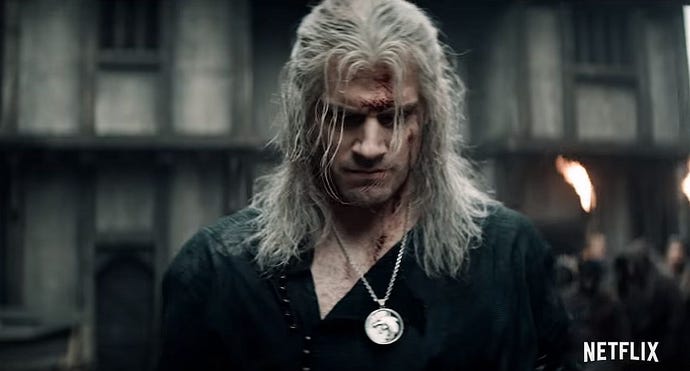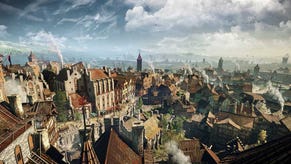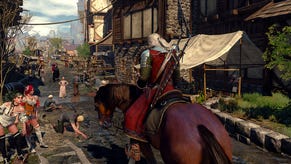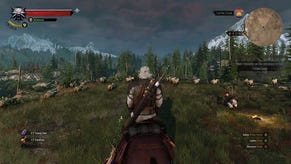The Witcher Netflix trailer captures Geralt's most relatable trait: reluctance
“So that's all life is to you? Monsters and money?”
That's the key line in the new Witcher telly trailer revealed at San Diego Comic Con last weekend. Anybody who's played a CD Projekt Red game knows the answer: Geralt has far more about him than that. The pale wonder does run a cash-in-hand monster control business, it’s true - but he’s also saved lives, affected huge political change, and made the kind of decisions you and I would never be trusted with. I mean, you and I are probably both going to buy The Witcher 3 at full price again for the Switch. We’re not responsible people.
You can understand, though, why somebody might underestimate Geralt’s social consciousness. In his world, witchers are rumoured to have no feelings, and he doesn’t exactly go out of his way to demonstrate emotional range - instead greeting a chaotic world with a visage of eerie calm. He eschews factional affiliation, fighting to stay politically unengaged with the same vehemence as the Ohio man who listens to white noise tapes at the coffee shop to avoid learning anything about US current affairs.
To understand why Geralt’s like this, you have to know where he’s from. Not Rivia, but post-Soviet Poland. The Witcher was a product of the ‘90s, the decade in which Poland found its feet as a capitalist country after 44 years of communist rule. The books written by Andrzej Sapkowski were a reaction against the idealism that had come before. The Polish people had become tired of the propaganda and paternalism of the socialist state, which had presided over an era defined by economic struggle, strikes, and a period of martial law.
This was a time in which Polish pop culture became anti-political. A new soft drink, Frugo, enjoyed enormous success by rejecting what had come before. Its TV adverts showed a cool teenager in baggy jeans defacing a grey Soviet world, relishing his freedom from the food shortages of the past, and ignoring the admonishments of socialist authority figures and church moralists alike.
The new anti-politics was all about embracing the market, and with it the Western goods that had represented an unreachable ‘normality’ for Poles in the dying years of the socialist era. It found a literary hero in Geralt, a fighter whose only battle cry was “I don’t work for free”.
More than once, critics have noted Geralt’s resemblance to the protagonist of Władysław Pasikowski’s 1992 film Pigs, the former secret police officer Franz Maurer. Maurer considered himself beyond the “good and evil” of Polish politics, removing “baddies” whatever their uniform. Socialists and their opponents were treated with equal disdain.
You can see the parallels in Geralt’s lack of respect for pre-established order. In Blood and Wine, CD Projekt Red’s final Witcher 3 expansion, a nobleman in French-drenched Toussaint complains that Geralt doesn’t show him the proper deference.
“Listen, friend,” Geralt tells him. “There’s an enormous difference between us but it’s not about status - it’s about me having two swords on my back, and you having none. So I’ll call you whatever I want.”
The one hierarchy the witcher respects is a kind of frontier rule. It’s fitting, then, that the only rituals he observes aren’t social - they’re for the monsters, the battle peers for whom he takes the time to prepare his tinctures and meditate.
That way of life is most jarring when Geralt visits Vizima, the new seat of Nilfgaardian power in the north during the events of The Witcher 3. The sequence begins with an attempted wolf taming - Geralt is bathed, groomed, dressed in the Nilfgaardian fashion, taught how to bow, even how to address his betters and at what volume. But as soon as he enters the Emperor’s chambers, the manners slip away. Geralt isn’t wowed by the trappings of power, and sees them for what they are - an excuse to trample other nations into the dirt under the guise of cultural enlightenment.
“I think anyone can be wrong,” he tells Emhyr var Emreis. “Even an Emperor.”
It’s in moments like these that Geralt’s aloofness is revealed not to be apathy. He’d be a far less appealing character if it were. In fact he’s often compelled to speak truth to power, and when he’s passed over to a Nilfgaardian ambassador to learn about recent events, turns out to be surprisingly knowledgeable about current affairs.
“Couldn’t you just go home?”, he suggests on the war. “Save everyone a lot of marching. Not to mention a few human lives.” The fact that Geralt doesn’t pick sides isn’t a sign he cares too little, but too much. Ultimately, he’s always on the side of the people caught up in the ideological crossfire.
The Comic Con trailer posed the question, and so it’s reasonable to assume the TV show will give us the answer: life isn’t just monsters and money to Geralt. Instead he’s like a lot of us in 2019 - weary but angry, alternately driven to disconnect from and bring change to the miserable world around him.









